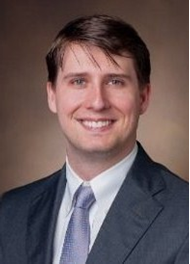 Bryan Hartley, M.D., Interventional Radiologist and Instructor in Clinical Radiology and Radiological Sciences, was recently accepted to the Stanford Biodesign Innovation Fellowship program.
Bryan Hartley, M.D., Interventional Radiologist and Instructor in Clinical Radiology and Radiological Sciences, was recently accepted to the Stanford Biodesign Innovation Fellowship program.
The one-year educational program, beginning in August 2017, is designed for postgraduate fellows with expertise in medicine, engineering and business. Over the course of the year, the program’s 12 fellows will work to identify unmet clinical needs, invent technology to solve those needs, and develop an implementation plan to bring their products to market.
"I'm very excited to be immersed in the Stanford culture of innovation," said Dr. Hartley. "I look forward to getting to know and learn from the other Biodesign fellows and faculty, as well as working to improve patient care through a clinical needs-based approach."
A graduate of Vanderbilt’s diagnostic radiology residency and Interventional Radiology (IR) fellowship programs, Dr. Hartley says the residency program’s Leadership Development Program is what ultimately cultivated his interest in medical device innovation and entrepreneurship.
“Through the program, I was able to participate in a novel course at the Center for Technology Transfer and Commercialization, begin collaborating in Dr. Bob Webster's mechanical engineering lab, and ultimately decide that I wanted healthcare technology to be a central focus of my career trajectory,” he said. “My training as a resident, fellow and clinical instructor, has been instrumental in preparing me for the Biodesign fellowship.”
Dr. Hartley will spend the upcoming academic year in Palo Alto, California, where he’ll learn from an extensive mentoring network of more than 100 industry experts in areas including design, research and development, and clinical testing. Following the completion of the fellowship, he hopes to return to Vanderbilt and help incorporate the Biodesign process into some of the Medical Center’s ongoing innovation initiatives.
“I plan to leverage my experience at Biodesign to push the boundaries of minimally invasive interventions, teach the next wave of innovators the benefits of patient-centered design, and practice clinical IR,” said Dr. Hartley.
“This is a prestigious honor for Dr. Hartley,” added Filip Banovac, M.D., Associate Professor of Radiology and Radiological Sciences and Interventional Radiology Section Chief. “We congratulate him on this outstanding achievement, and look forward to seeing all that he accomplishes through the Biodesign program.”